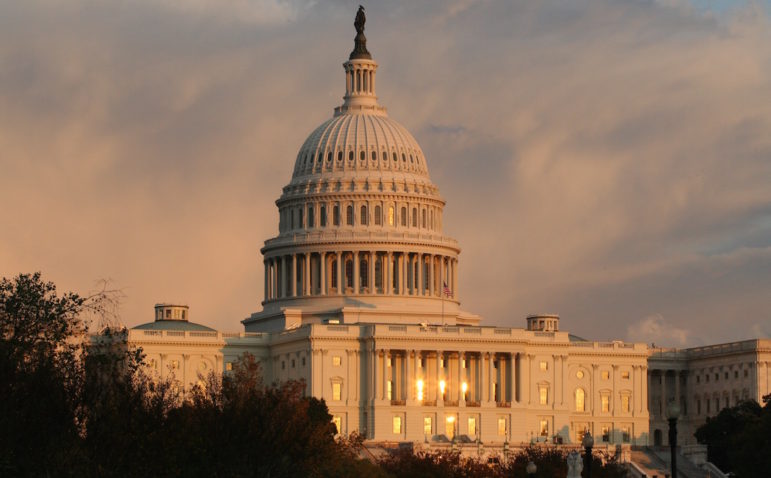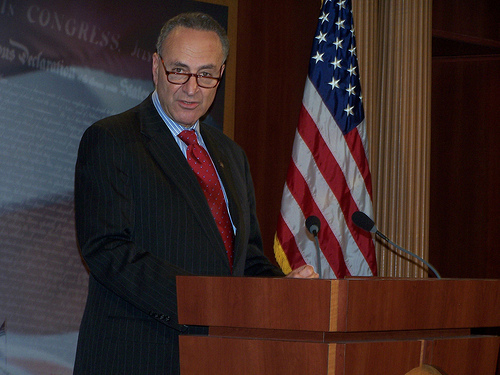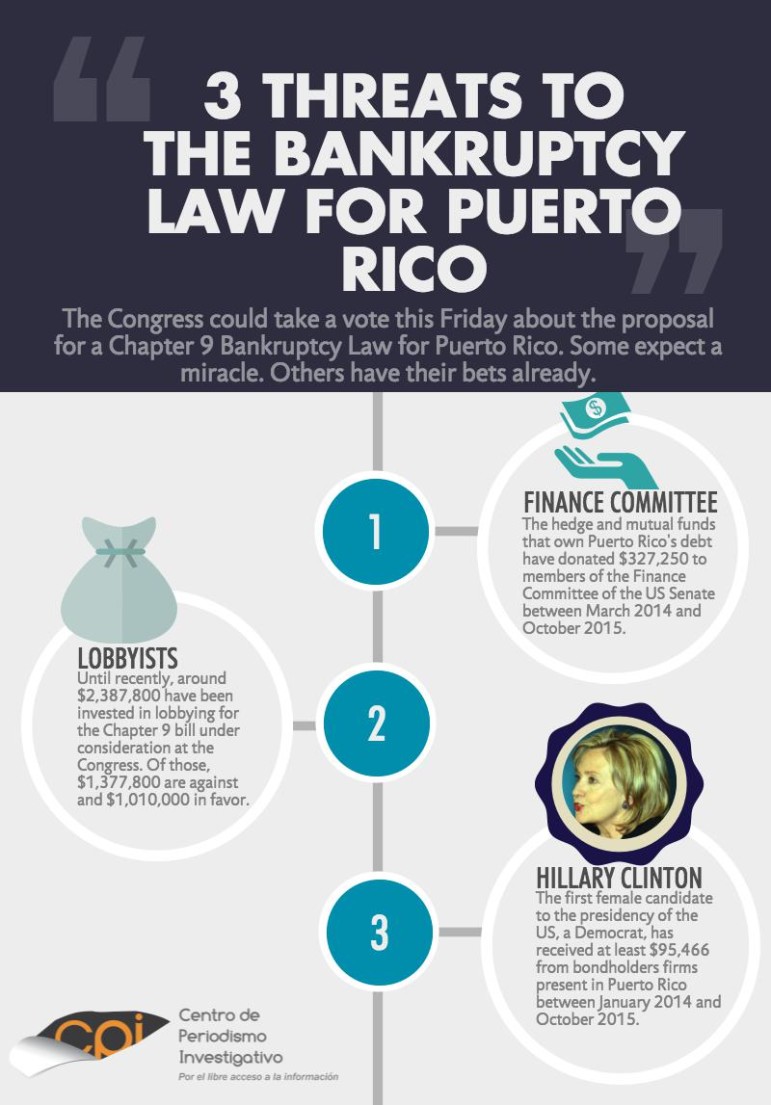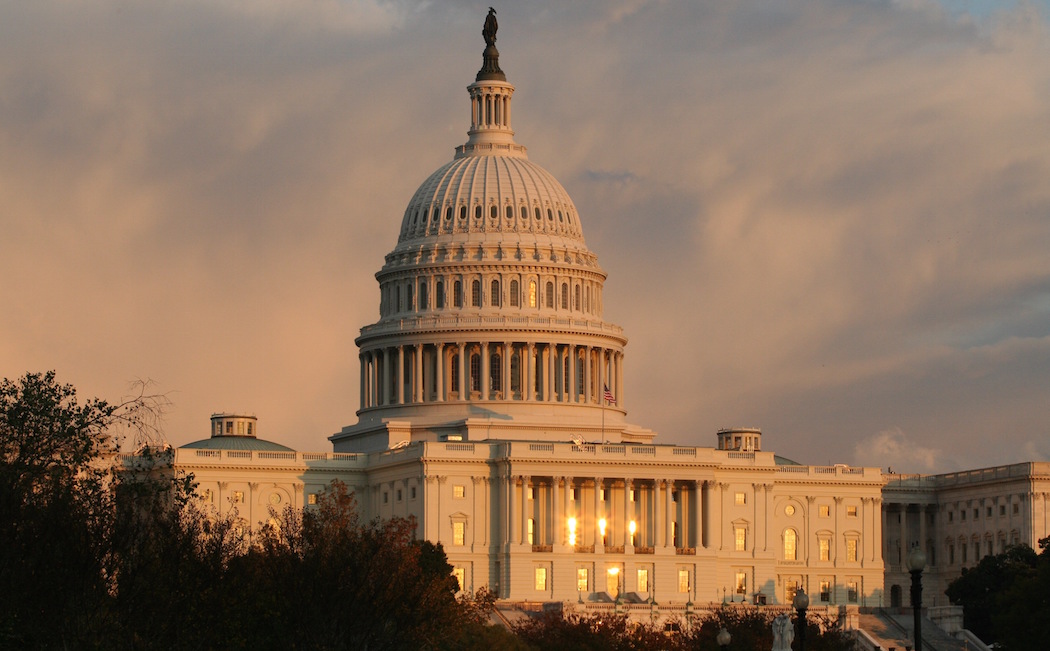
The government of Puerto Rico awaits that the Congress of the United States will include Chapter 9 of the Bankruptcy Law or some type of measure that will address the island’s fiscal crisis in its end-of-the-year budget on Friday, after five hearings regarding the island’s economic situation held by Congress committees in 2015, which have proven unproductive.
At the same time, Democrats and Republicans with the power to authorize or reject any measure to address the island’s fiscal crisis are getting ready for the 2016 elections and their campaign committees have been receiving political donations from mutual and hedge fund companies that hold Puerto Rico government debt.
In 1984, Puerto Rico corporations and municipalities were excluded from Chapter 9 of the federal Bankruptcy Law through amendments. In 2014, following a lawsuit by mutual fund companies Oppenheimer Fund and Franklin Templeton, directed at the government of Puerto Rico, the U.S. District Court in San Juan and the First Circuit in Boston declared unconstitutional the “Puerto Rico Public Corporations Debt Enforcement and Recovery Act,” which allowed public corporations to restructure their debt. Last week, the U.S. Supreme Court made the announcement that it will re-evaluate the decision.
The investment firms that are waiting to collect the $72 billion debt from the U.S. Commonwealth and its corporations have separated into two groups: those who are against and those who are in favor of the restructuring of the debt or that the island be included in Chapter 9 of the federal Bankruptcy Law. The Democrats have said that support a bill, H.R. 870, which was introduced to the U.S. House of Representatives by Resident Commissioner in Washington Pedro Pierluisi that seeks to include Puerto Rico in Chapter 9 of the federal Bankruptcy Law. The Republicans, as a majority, are opposed to this measure.
Politicians from both parties that are members of the U.S. Senate Finance Committee, which has to evaluate the Chapter 9 measure for Puerto Rico and held a hearing in regards to this issue in September 2015, have received $327,250 in donations from the mutual fund and hedge fund companies that hold the islands bonds, the Center for Investigative Journalism found out. The 14 Republicans that make up the majority of the members of the Senate Finance Committee and 10 of the 12 Democrats members of this committee have received donations from the companies between March 2014 and October 2015, according to the Federal Electoral Commission’s documents.
On the other hand, the Senate Judiciary Committee, which held the most recent hearing on the crisis of the government of Puerto Rico last week, is made up of 11 Republicans and 9 Democrats, of which seven Republicans and seven Democrats have received donations from investment firms that hold Puerto Rico government bonds during the same period. The political donations were made through investment firm employees or through Political Action Committees.
The politician that has benefitted the most from donations made by investment firms holding Puerto Rico bonds has been Charles “Chuck” Schumer, Senator from New York and member of the Finance and Judiciary Committees, who has expressed his support of Chapter 9 of the federal Bankruptcy Law for the Commonwealth. Between March 2014 and October 2015, he received $99,150 from these companies.
Among Schumer’s donors that hold bonds in Puerto Rico, are hedge and vulture funds firms: York Capital, Fore Research & Management, Appaloosa Management, Fir Tree Capital, Davidson Kempner, Redwood Capital, Centerbridge Capital, Avenue Capital, Blue Mountain, Apollo Management, and D.E. Shaw. In addition, law firms hired by different bondholder groups in Puerto Rico have also made donations, such as: Quinn Emanuel Urquhart & Sullivan, firm hired the Ad Hoc Group of bondholders of COFINA (Puerto Rico Sales Tax Financing Corporation), Davis Polk &Wardwell, hired by the Ad Hoc bondholders group of the GDB (Government Development Bank), and Gibson Dunn, hired by the bondholders of the AEE (Puerto Rico Electric Power Authority).

http://www.schumer.senate.gov/newsroom/photos
Charles Schumer
Schumer has also received donations from companies hired to lobby in favor or against including Puerto Rico in Chapter 9 of the federal Bankruptcy Law: Podesta Group, hired by the government of Puerto Rico to lobby in favor, and Venable LLP, hired by the investment firms to lobby against including Puerto Rico. The Investment Company Institute of Mutual Funds, MassMutual Life Insurance and the Oppenheimer Fund have also made donations to Schumer. MassMutual and its subsidiary company, the Oppenheimer Fund, which according to Morningstar hold more than $4 billion in Puerto Rico bonds, are opposed to the restructuring of the debt. Besides donating to Schumer, MassMutual and the Oppenheimer Fund made donations to Charles Grassley, who leads the Judiciary Committee and at the same time, is a member of the Senate Finance Committee and against including Puerto Rico in Chapter 9.
“There are political interests that have two sides. They push one side more than the other but they cover themselves with the other side just in case as to not get too hot. This is the cockfighters’ strategy: I’ll bet on my rooster but I’ll bet on my opponent’s in case I lose. It’s a matter of political maturity and we should not only focus about about people in favor and the others against. This is why I don’t have any problem saying that bankruptcy for Puerto Rico is impossible, money is against it,” said Alfonso Giménez-Lucchetti, political and international issues commentator who has worked with the Democratic Party in the United States.
Last July, Schumer introduced another legislative motion in the Senate to allow public corporations and municipalities in Puerto Rico to file Chapter 9 of the federal Bankruptcy Law, in a bill prepared jointly with Richard Blumenthal, Democrat and member of the Senate Judiciary Committee. Schumer’s proposal received support from the Democrats but not from the Republicans. At the last hearing on the topic of the crisis held by the Judiciary Committee last week, Schumer asked Congress to pay attention to financial situation in Puerto Rico and said that the protection provided by Chapter 9 of the federal Bankruptcy Law is a necessary measure but it is not enough to solve the island’s crisis.
“I am not surprised that Schumer has many donations from investment funds because he is the Senator from New York and the majority of those funds have their operation base in New York. And Schumer is the first one that is promoting the Chapter 9 bill that I introduced to the House (of Representatives) and is one of the co-authors in the Senate,” said Pedro Pierluisi, Resident Commissioner in Washington, when asked about the influence of donations to politicians as related to the Puerto Rico debt.
Hedge Funds’ Influence On Politics
The employees of the hedge fund companies have traditionally donated to political campaigns as individuals, but it wasn’t until 2007 that this industry emerged as a significant sector in the political arena of the United States. Monica Vendituoli, economist and reporter, has observed the growth of the hedge fund industry as an influential political group that coincided with the growth of legislative scrutiny of the financial industry to which they belong.
Hedge funds had mainly donated to Democratic campaigns until 2010, but in 2012 they received 24 percent of the contributions only by hedge funds. These funds invested more than $7.1 billion in lobbying and more than $40 billion in political donations in the 2012 election cycle, more than twice that they had invested in 2008, according to the Center for Responsive Politics.
The hedge fund’s main concern between 2010 and 2012 was the implementation of the Dodd-Frank Wall Street Reform and Consumer Protection Act. The law, signed by President Barack Obama in July 2010, aimed to prevent another recession and economic crisis like the one which started between 2007 and 2008 in the United States, when the largest economic turmoil occurred since the Great Depression in the 1930’s, according to the economist John Stiglitz. This crisis was linked to speculation of real estate industry, banks, and Wall Street investment companies.
The Dodd-Frank Law introduced significant changes to financial capitalism. In one of its articles, for the first time, hedge fund (companies) were required to register under the law as “investment advisors” and increased the amount of reports required by several federal agencies from the financial advisors, which included the hedge funds in this law. After five years of its signing, some sectors say that it is not enough and want more regulation of the financial sector, while the Republicans in Congress push to weaken the law, according to an editorial by The New York Times.
Super PAC: Uncoordinated Political Campaigns?
Individual donations made to the committees of political candidates in the United States could not exceed $2,700 per person. Meanwhile, corporations or syndicates were not allowed to make political donations or expenses related to the elections.
But, as of 2010, in the case of Citizens United vs. FEC, corporations, syndicates and individuals have a new option in making political donations in the United States: the Super PACs. The committees are established to collect unlimited amounts of money for campaigns that attack or promote candidates, but they cannot coordinate these campaigns with the candidates or with the parties that support them.
“For example, take the Super Pac behind Marco Rubio. They can’t coordinate with Marco Rubio. Super Pacs cannot coordinate with the candidates that they support but they can make independent expenditures in unlimited amounts from any source, like corporations, individuals, etcetera,” as explained by Will Tucker, reporter from the Open Secrets organization, a database specializing on political campaigns and donations.
How will the politician know who made donations?
“That’s a good question, because it brings up the inquiry as to whether the campaign is truly coordinated or not,” answered Tucker.
“Citizens United has opened participation of companies and corporations, it has accentuated the strength of powerful emporiums, it has removed regulations, it has increased the allowed amounts, and through this the balance between freedom of expression and transparency has been violated”, commented Marcia Rivera, sociologist and political analyst.
60 Plus, Mainstreet Bondholders and the Center for Individual Freedom
Another option available to influence politics is the creation of 501c4 nonprofit organizations, which function as political pressure groups. This type of corporation registered under Section 501 of the Internal Revenue Service (IRS), “frequently uses its money to influence (politically), reporting independent expenses and are not required to state how they received the money,” Tucker explained.
An example of this type of organization is 60 Plus, which created the “Mainstreet Bondholders” project and has brought together a coalition of bondholders in Puerto Rico. The 60 Plus entity says it represents older people and is primarily financed by multi-millionaires David and Charles Koch.
This type of organization is not allowed to state as its principal purpose to influence political party issues, and they are not required to reveal who their contributors are. Mainstreet Bondholders lobby in the United States and in Puerto Rico against the restructuring of the government debt and are against that Chapter 9 of the federal Bankruptcy Law be extended to the island. They have invested tens of thousands of dollars in Puerto Rico through radio media propaganda, printed press, and on the Internet against the federal Bankruptcy Law and the present administration’s stance.
The Center for Investigative Journalism (CIJ) questioned Matthew Kandrach, vice president of 60 Plus, who the organization’s contributors were and how it has been invested in media related to the Puerto Rico debt. Kandrach refused to reveal the information.
In 2014, the Citizens for Responsibility and Ethics organization, presented a complaint against 60 Plus and its President, Amy Noone Frederick, to the IRS for violating the federal Law in not revealing the $11 million spent in political activities in 2010 and 2012.
In reports signed by Frederick, 60 Plus informed the FEC that it had spent $6,719,111 in “independent expenses” in political campaigns in 2010 and another $4,615,957 in 2012. A major part of these funds were used in the production and dissemination of television propaganda that supported Republican candidate Mitt Romney for president and others were against Democratic Congressional candidates. In spite of the FEC report and the content of the ads, the group did not inform expenditures to the IRS. Jordan Libowitz, Communications Director for Citizens for Responsibility and Ethics, explained to the CIJ that the results of the IRS investigation on 60 Plus have not been revealed.
Another 501(c4) nonprofit organization that has a campaign against Chapter 9 for Puerto Rico is the Center for Individual Freedom, a conservative group that set aside $1.9 mill in 2012 for media campaigns against Democratic politicians. This year, the Center for Individual Freedom has spent $26,000 for lobbying in Congress, which includes the opposition to Chapter 9.
“At the very least, there should be a requirement in the law where contributors have to identify themselves. I believe, that as part of a democracy, people and the press should have access to their names, addresses and, if they are corporations, we need to know which corporations are making donations, as well as individual donors. I am in favor that there should be more transparency in the electoral process and in contributions,” Pierluisi told CIJ when interviewed.
“The United States approved measures that gave power to those who had to be scrutinized. (In the case of Citizens United) a sort of political market has been opened. Those who contribute expect some sort of payback. An analysis of the future is made, in finance, for example; this has become the norm,” an opinion given by Rivera.
“Whoever has the most money, whoever contributes the largest amount to the campaign, gets more in return. To speak of American democracy is a fallacy, a myth. I donate a million dollars to the campaign of a Senator. Clearly, what interests does that Senator have in mind? Mine. And we see this happen more and more, more multimillionaires contribute to the campaign and those multimillionaires have a high probability of not only electing but keeping people in Congress and in the Senate. This is a country where less than 50 percent of the population participates (in the electoral process), to participate you need money, you need a lot of money to win and they respond to those who paid for their campaign,” added Giménez-Lucchetti.
In the United States, a nation with more than 320 million inhabitants, only 158 families and companies have donated almost half the money that has reached the White House, $176 million in only the first phase of the 2016 electoral cycle, according to The New York Times.
“They are only beginning. We are still in primaries. They are warming up,” Giménez-Lucchetti said.
How often do the politicians check the list of donations to see who and how much money has been donated to their political campaigns?” the CIJ asked Giménez.
“This is similar to a drug addict: they know who supplies them and who doesn’t. They know who supplies them on a constant basis. There are so many interests trying to influence public politics that, at times, there are interests that favor or are in opposition to a measure and both interests are equally powerful or both interests have had weight or a certain influence on the candidate or party,” responded Giménez-Lucchetti, who considers that the Congressional hearings have become a “pro forma” process.
“Theoretically, you listen to the parties involved and take them into consideration. Unfortunately, for some time now, public hearings stopped being a forum to listen to the parties and consider the issues, but it has become pro forma, so that it is ‘on the record’ that we listened to the parties involved,” Giménez-Lucchetti said.
The Resident Commissioner accepts that “the reason these hearings are held is that they have to acknowledge the issue or, at least, listen to it. They do not have a choice in the matter, the issue of Puerto Rico has generated so much press coverage, in Washington, in New York, in Europe, that they cannot ignore it… the least they have to do (members of Congress) is ‘become acquainted with, become informed’.
“I believe the hearings are mostly pro forma. Having held three hearings does not mean that there is any interest in Puerto Rico, at least in a structured form, to become involved in this mess,” Marcia Rivera commented.
Chapter 9 Lobbying
 The lobbying in the two measures submitted in Congress to extend Chapter 9 to Puerto Rico add up to more than $1,377,800 against it and $1,010,000 in favor, in the three trimesters in 2015. These amounts could be larger, since in some cases, the lobbying reports in the House of Representatives and the Senate several bills can be included under the same budget and the amount assigned to each measure is not specified.
The lobbying in the two measures submitted in Congress to extend Chapter 9 to Puerto Rico add up to more than $1,377,800 against it and $1,010,000 in favor, in the three trimesters in 2015. These amounts could be larger, since in some cases, the lobbying reports in the House of Representatives and the Senate several bills can be included under the same budget and the amount assigned to each measure is not specified.
The government efforts in favor of the measure are channeled through the Podesta Group, Smith Dawson & Andrews, The Roth Group, and Primer Policy. The ELA (Commonwealth) has invested a total of $300,000 in 2015, this total includes lobbying efforts of other issues not related to Chapter 9. Another player that lobbies in favor of Chapter 9 is the Fonalledas Company. It has spent $490,000 in the last three quarters of 2015 in lobbying in favor of this measure through the East Por LLC and Akin Gump firms.
Vulture funds companies, Blue Mountain, Knighthead, Marathon Asset, and Angelo Gordon & Co. have lobbied against the insurance company Ambac Financial Group, the Center for Individual Freedom and the National Public Finance Guarantee Corp.
“The lobbyist group is an industry that thrives on those interests. If you show me opposition, I will lobby against you. I know that you are going to win but I make money lobbying against you. This is barbaric capitalism. To lobby against something that is impossible to defeat is part of the business. The lobbyists know this but provide hope that we can make you win even though they know it is not going to happen. This is the game of – in parenthesis – American democracy”, stated Giménez-Lucchetti.
But, does that strategy work on politicians?
“Not much. When they are clearly in favor of one party, well, no,” concluded Giménez-Lucchetti.
Laura Moscoso and Carla Minet collaborated in this article.




Saludos. La última gráfica en el artículo tiene un “typo” en el título: debe ser “THREATS”, no “TREATS”.
Gracias por el magnífico trabajo que realizan.